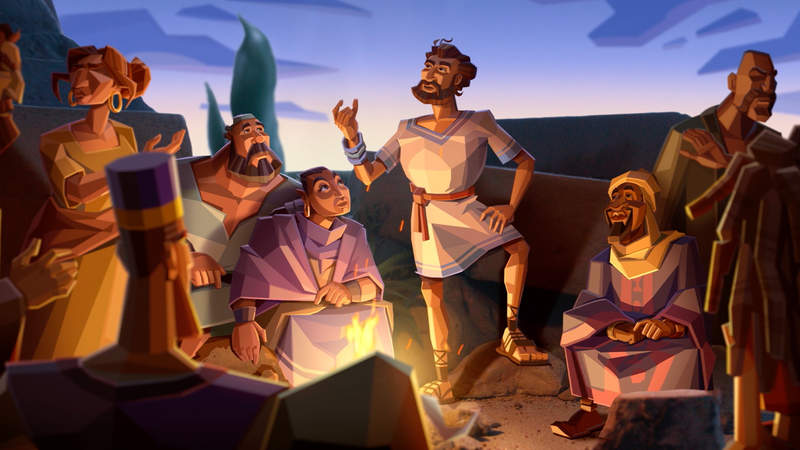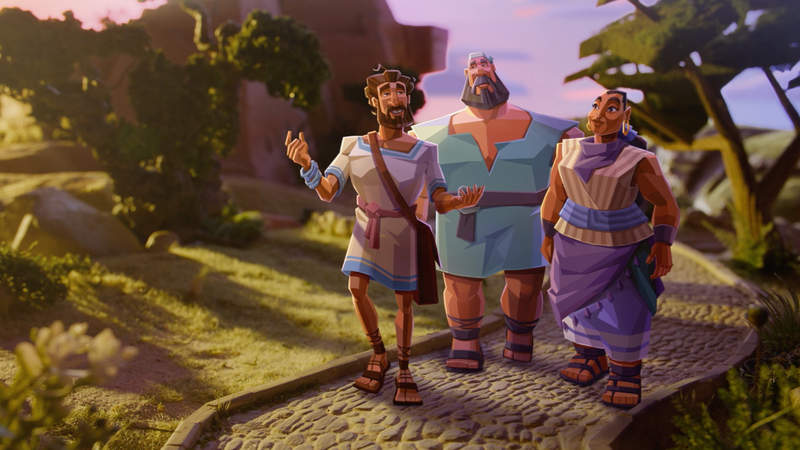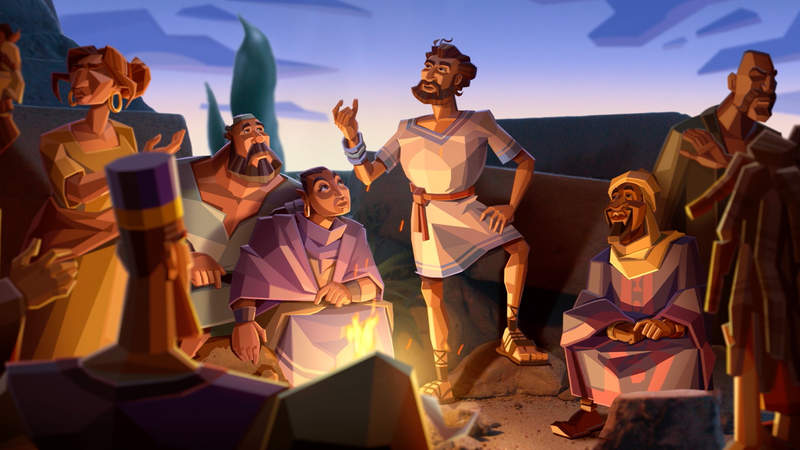The Choice
About

In the 1st century, an Israelite rabbi named Jesus of Nazareth begins a movement that he says fulfills the Torah and Prophets, which are his ancient Scriptures. In a collection of teachings now referred to as the Sermon on the Mount, Jesus announces this movement to those who hunger for a world set right—the powerless, the sick, and the poor. He calls these people to radical peacemaking and generosity, and he refers to this movement as the arrival of the Kingdom of the skies. And in the closing section, Jesus presents his listeners with a choice. Will they respond to his invitation to the challenging but truly rewarding way to life? Or will they choose the easy way that leads to destruction?
In this guide, discover Jesus’ concluding words in the Sermon on the Mount, where he presents three images: two gates, two trees, and two houses. Explore related videos, podcast episodes, and more.
Context
Key Themes
- The challenging way that leads to life versus the easy way that leads to ruin
- Discerning true and false prophets based on the fruit of their lives
- Discerning true and false followers of Jesus based on their alignment to God��’s will
- The wisdom of building one’s life on Jesus’ teaching versus the folly of building on anything else
- The authority of Jesus’ teaching
Structure
The Two Gates and Two Paths
By the time we get to Matthew 7:13-27, Jesus has finished teaching about what it looks like to do right by God and others in the Kingdom of the skies. In the Bible, the skies are the ultimate image of God’s realm, where life and justice prevail. And so Heaven arriving on Earth means God’s goodness overcomes death and violence here on the land. In fact, the biblical story begins with this kind of Heaven-on-Earth place—the garden in Eden. Walking with God in the garden, being sustained by his love, and building a home together, this is truly the way to life.
But there is another path that leads out of the garden and away from God’s life. A deceptive creature appears in the garden, suggesting that God can’t be trusted and the good life can be found by taking this easier way. The humans choose this path and are sent out of the garden.
22 Then the Lord God said, “Behold, the man has become like one of Us, knowing good and evil; and now, he might reach out with his hand, and take fruit also from the tree of life, and eat, and live forever”— 23 therefore the Lord God sent him out of the Garden of Eden, to cultivate the ground from which he was taken. 24 So He drove the man out; and at the east of the Garden of Eden He stationed the cherubim and the flaming sword which turned every direction to guard the way to the tree of life.
While this path may appear easier, it actually leads to violence and death. So the Torah and Prophets tell the story of God choosing one family (Israel) and giving them his torah (instruction) to return to God’s presence once again. They can build homes and communities where God will come to live among them, demonstrating to the rest of the world the way back to true life in God.
But, like the first humans, Israel is deceived. Even Israel’s own prophets and leaders, who claim to speak on God’s behalf, deceive the people, leading them on the path to destruction. The prophet Ezekiel calls these leaders wolves—instead of caring for their people, they devour them.
25 There is a conspiracy of her prophets in her midst like a roaring lion tearing the prey. They have devoured lives; they have taken treasure and precious things; they have made many widows in the midst of her. 26 Her priests have done violence to My Law and have profaned My holy things; they have made no distinction between the holy and the common, and they have not taught the difference between the unclean and the clean; and they have closed their eyes from My Sabbaths, and I am defiled among them. 27 Her leaders within her are like wolves tearing the prey, by shedding blood and destroying lives in order to make dishonest profit. 28 And her prophets have coated with whitewash for them, seeing false visions and divining lies for them, saying, ‘This is what the Lord God says,’ when the Lord has not spoken.

In his teachings in the Sermon on the Mount, Jesus claims that God’s Kingdom has arrived with him. He is creating a new Israel who will take the right path, reject deceivers, and build something that lasts—that is, if they accept this calling. And so in the closing section of the Sermon on the Mount, Jesus presents a choice.
13 “Enter through the narrow gate; for the gate is wide and the way is broad that leads to destruction, and there are many who enter through it. 14 For the gate is narrow and the way is constricted that leads to life, and there are few who find it.
Jesus wants to be clear: the path to life is not easy. It can feel confining at times, and we’re likely to face difficult trials. But in reality, it’s the way to true freedom.
The Two Trees and Two Prophets
Jesus continues by warning that some people will try to lead us off the good path.
15 nor do people light a lamp and put it under a basket, but on the lampstand, and it gives light to all who are in the house.
If illegitimate prophets are disguised, how can we recognize them as wolves? Jesus says to pay attention to how they live. Do their choices produce life and flourishing for themselves and others or not?
16 You will know them by their fruits. Grapes are not gathered from thorn bushes, nor figs from thistles, are they?
In this case, fruit means the outcome of someone’s decisions, or their way of life. If we are the kind of people whose actions produce diseased fruit, we won’t last in God’s new reality. However, life can often feel more complex than that. We could produce enough good fruit to fool a lot of people (or even fool ourselves). But Jesus claims that on the Day of the Lord, when he sits to judge the nations, we won’t be able to fool him. Jesus says:
22 Many will say to Me on that day, ‘Lord, Lord, did we not prophesy in Your name, and in Your name cast out demons, and in Your name perform many miracles?’ 23 And then I will declare to them, ‘I never knew you; leave Me, you who practice lawlessness.’

Can someone imitate the actions of Jesus but never be known by him? It’s helpful to remember that earlier in the sermon, Jesus already warned about doing the right thing for the wrong reasons (see Matt. 6:1-21). If our motives are disconnected from our actions, we will miss out on the life giving, intimate connection that Jesus offers through himself.
The Two Houses
Jesus isn’t just presenting a choice about our behavior. The choice is in how we respond to his teachings. Will we let him transform us so that we become more and more aligned with God’s ways? Jesus illustrates this choice with another image: Where are we going to build our house? On the sand or on the rock?
24 “Therefore, everyone who hears these words of Mine, and acts on them, will be like a wise man who built his house on the rock. 25 And the rain fell and the floods came, and the winds blew and slammed against that house; and yet it did not fall, for it had been founded on the rock. 26 And everyone who hears these words of Mine, and does not act on them, will be like a foolish man who built his house on the sand. 27 And the rain fell and the floods came, and the winds blew and slammed against that house; and it fell— and its collapse was great.”
While this image may seem random to us, it’s rooted in the Hebrew Scriptures. “The house of God” is the most common phrase used to describe God’s temple up on the rocky hill of Jerusalem.
3 And many peoples will come and say,
“Come, let’s go up to the mountain of the Lord,
To the house of the God of Jacob;
So that He may teach us about His ways,
And that we may walk in His paths.”
For the law will go out from Zion
And the word of the Lord from Jerusalem.
10 For a day in Your courtyards is better than a thousand elsewhere.
I would rather stand at the threshold of the house of my God
Than live in the tents of wickedness.
5 Guard your steps as you go to the house of God, and approach to listen rather than to offer the sacrifice of fools; for they do not know that they are doing evil.

Jesus is explaining how God’s followers can build a community where God’s heavenly presence can reside here on earth—just like the garden of Eden. Jesus encourages us to build this kind of community because those places are the only ones that will last.
Like Jesus said at the very beginning of the sermon, “a city on a mountain cannot be hidden … let your light shine before people” (Matt. 5:14; Matt. 5:16). Jesus is describing a new humanity who lives together by God’s wisdom and love, creating communities of peace and justice even while violence and death surround us. In the Sermon on the Mount, Jesus gives us a bold vision for what this can look like, and his life and ministry on Earth carry out this vision. He continues to offer his followers the choice to do the same. And now, that choice is ours.


